Tips for keeping your new year resolutions
10 Tips to Help You Keep Your New Year’s Resolution for Fitness or Weight Loss
0 Comments
by: Louise Smith
Chances are at some time in your life, you’ve made a New Year’s resolution — and then broken it. This year, stop the cycle of resolving to make change and then not following through. If your resolution is to take better care of yourself and get healthy, you will have a much better year if your resolution sticks. Here are ten tips to help you get started.
1. Be Realistic
The surest way to fall short of your goal is to make your goal unattainable. For instance, resolving to NEVER eat your favorite food again is setting you up to fail. Instead, strive for a goal that is attainable, such as avoiding it more often than you do now.
2. Plan Ahead
Don’t make your resolution on New Year’s Eve. If you wait until the last minute, it will be based on your mindset that particular day. Instead, it should be planned well before December 31st arrives.
3. Outline Your Plan
Decide how you will deal with the temptation to skip that exercise class or have that piece of cake. This could include calling on a friend for help, practicing positive thinking and self-talk, or reminding yourself how your “bad behavior” will affect your goal.
4. Make a “Pros” and “Cons” List
It may help to see a list of items on paper to keep your motivation strong. Develop this list over time, and ask others to contribute to it. Keep your list with you and refer to it when you need help keeping your resolve.
5. Talk About It
Don’t keep your resolution a secret. Tell friends and family members who will be there to support your resolve to change yourself for the better or improve your health. The best-case scenario is to find a buddy who shares your New Year’s resolution and motivate each other.
6. Reward Yourself
This doesn’t mean that you can eat an entire box of chocolates if your resolution is to eat a better diet. Instead, celebrate your success by treating yourself to something you enjoy that doesn’t contradict your resolution. If you have been sticking to your promise to eat better, for example, reward yourself with new fitness clothing or by going to a movie with a friend.
Instead, celebrate your success by treating yourself to something you enjoy that doesn’t contradict your resolution. If you have been sticking to your promise to eat better, for example, reward yourself with new fitness clothing or by going to a movie with a friend.
7. Track Your Progress
Keep track of each small success. Short-term goals are easier to keep, and each small accomplishment will help keep you motivated. Instead of focusing on losing 30 pounds, focus on losing the first five. Keep a food journal to help you stay on track, and reward yourself for each five pounds lost.
8. Don’t Beat Yourself Up
Obsessing over the occasional slip won’t help you achieve your goal. Do the best you can each day, and take one day at a time.
9. Stick to It
Experts say it takes about 21 days for a new activity to become a habit and six months for it to become part of your personality. It won’t happen overnight, so be persistent and patient!
10.
 Keep Trying
Keep TryingIf you have totally run out of steam when it comes to keeping your resolution by mid-February, don’t despair. Start over again! Recommit yourself for 24 hours. You can do anything for 24 hours. The 24-hour increments will soon build on each other and, before you know it, you will be back on track.
What are your New Year's goals? Share them in the comments section below, and start getting support now!
Also in Blog
Body Peace & Personal Empowerment
From the moment we’re born and take our first breath, we’re being socialized or learning what it means to be a member of the culture we were born into. We begin learning through both subtle and overt cues, messages, observations and images what the values and norms of that culture are in that time and place. We learn what is acceptable, desirable, worthy, valuable… and what isn’t.
Yoga for Swimmers: Poses for Strength and Mobility
Micha Shaw, former pro swimmer, walks us through five yoga poses that help athletes who perform repeated movements day in and day out, to not only increase flexibility, mobility and strength, but also bring awareness to movement patterns, enhance performance and stay injury-free.
Amanda Huggins: From Anxiety to Empowerment
Amanda Huggins, anxiety coach and Gaiam influencer, tells the story of how she transformed her anxiety into empowerment and offers journaling prompts to begin the process of understanding your relationship with anxiety.
How to Make (and Keep) a New Year's Resolution - Smarter Living Guides
By Jen A. Miller
Illustrations by Abbey Lossing
Are you making a resolution in the new year? Warning: More than half of all resolutions fail, but this year, they don’t have to be yours. Here’s how to identify the right resolution to improve your life, create a plan on how to reach it, and become part of the small group of people that successfully achieve their goal.
Pick the Right Resolution
You’ll give yourself your best shot at success if you set a goal that’s doable — and meaningful too.
According to the time management firm FranklinCovey, one third of resolutioners don’t make it past the end of January.
A lot of these resolutions fail because they’re not the right resolutions. And a resolution may be wrong for one of three main reasons:
- It’s a resolution created based on what someone else (or society) is telling you to change.
- It’s too vague.
- You don’t have a realistic plan for achieving your resolution.
Your goals should be smart — and SMART. That’s an acronym coined in the journal Management Review in 1981 for specific, measurable, achievable, relevant and time-bound. It may work for management, but it can also work in setting your resolutions, too.
- Specific. Your resolution should be absolutely clear. “Making a concrete goal is really important rather than just vaguely saying ‘I want to lose weight.’ You want to have a goal: How much weight do you want to lose and at what time interval?” said Katherine L. Milkman, an associate professor of operations information and decisions at the Wharton School of the University of Pennsylvania.
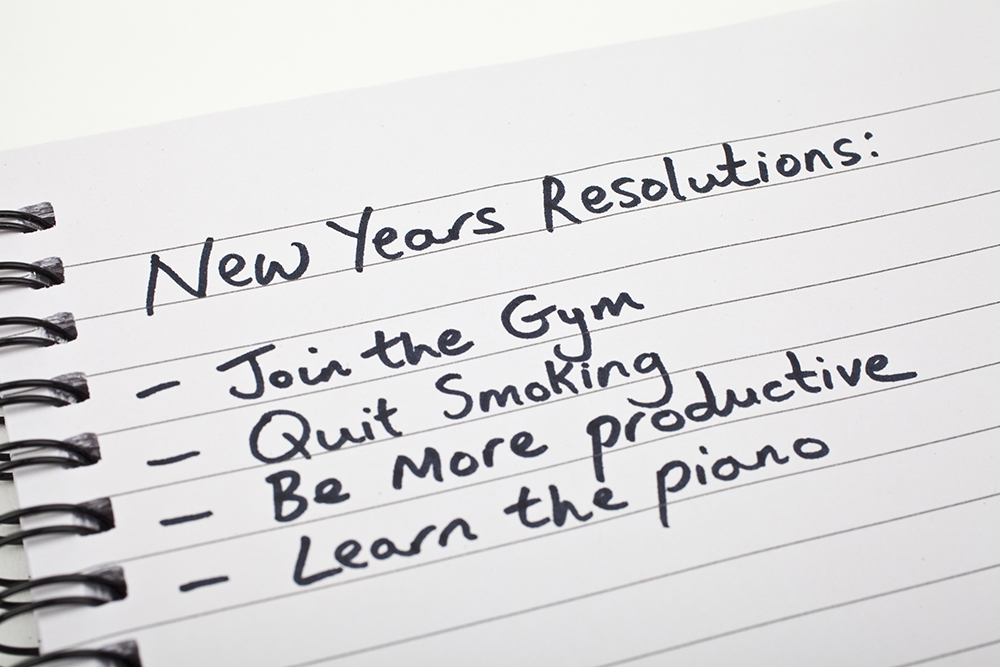 “Five pounds in the next two months — that’s going to be more effective.”
“Five pounds in the next two months — that’s going to be more effective.” - Measurable. This may seem obvious if your goal is a fitness or weight loss related one, but it’s also important if you’re trying to cut back on something, too. If, for example, you want to stop biting your nails, take pictures of your nails over time so you can track your progress in how those nails grow back out, said Jeffrey Gardere, a psychologist and professor at Touro College of Osteopathic Medicine. Logging progress into a journal or making notes on your phone or in an app designed to help you track behaviors can reinforce the progress, no matter what your resolution may be.
- Achievable. This doesn’t mean that you can’t have big stretch goals. But trying to take too big a step too fast can leave you frustrated, or affect other areas of your life to the point that your resolution takes over your life — and both you and your friends and family flail. So, for example, resolving to save enough money to retire in five years when you’re 30 years old is probably not realistic, but saving an extra $100 a month may be.
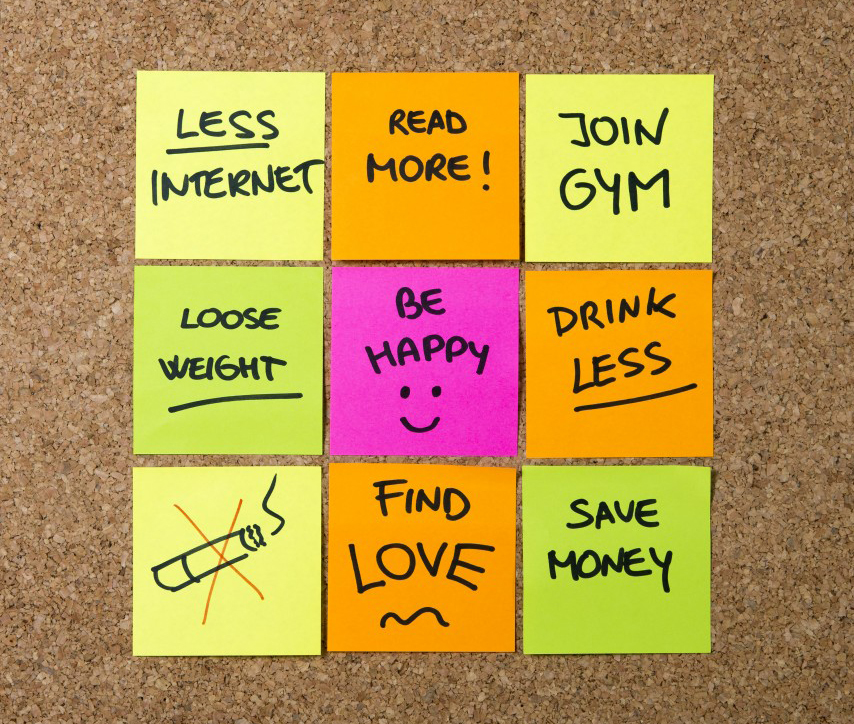 (And if that’s easy, you can slide that number up to an extra $200, $300 or $400 a month).
(And if that’s easy, you can slide that number up to an extra $200, $300 or $400 a month). - Relevant. Is this a goal that really matters to you, and are you making it for the right reasons? “If you do it out of the sense of self-hate or remorse or a strong passion in that moment, it doesn’t usually last long,” said Dr. Michael Bennett, a psychiatrist and co-author of two self-help books. “But if you build up a process where you’re thinking harder about what’s good for you, you’re changing the structure of your life, you’re bringing people into your life who will reinforce that resolution, then I think you have a fighting chance.”
- Time-bound. Like “achievable,” the timeline toward reaching your goal should be realistic, too. That means giving yourself enough time to do it with lots of smaller intermediate goals set up along the way. “Focus on these small wins so you can make gradual progress,” Charles Duhigg, author of “The Power of Habit” and a former New York Times writer, said.
 “If you’re building a habit, you’re planning for the next decade, not the next couple of months.”
“If you’re building a habit, you’re planning for the next decade, not the next couple of months.”
More on Choosing a Resolution
Create Your Plan
Your end goal won’t just magically appear. Here are ways to figure out how to get there.
Because you won’t just wake up and change your life, you not only need a plan for what to do, but also for what roadblocks you’ll come across along the way.
If you’re trying to form or break a habit, Mr. Duhigg suggested breaking down that habit into its three parts: a cue, a routine and a reward.
For example:
Bad Habit: I check Twitter too often.
Cue: I feel isolated.
Routine: I check Twitter.
Reward: I feel connected.
Way to change the behavior: Instead of checking Twitter, get up and talk to a colleague.
What about if you have a really bad health habit?
Bad Habit: I smoke.
Cue: I’m tired.
Routine: I smoke a cigarette.
Reward: I’m stimulated.
Way to change the behavior: Instead of smoking a cigarette, replace the stimulus with something else, like coffee.
Or if your habit affects your whole day?
Bad Habit: I don't get enough sleep at night.
Cue: I feel like I need time to myself in the evening.
Routine: I stay up too late watching TV.
Reward: I'm entertained.
Way to change the behavior: Instead of staying up late to watch TV, carve out special time each day to spend by yourself, even if that may mean asking for help with your children or taking a break from work each day.
Make it Personal
Of course, the cue and routine for a common bad habit, like smoking, is as individual as the person trying to quit. You may need to do some work to figure out what the real cue for the habit you want to change is, and then what will replace it.
Both the cue and reward should be easy and obvious. Let’s look at one example in depth. For running, a cue could be just putting on your running clothes, even if at first you don’t do anything after that. “Oftentimes when people have never exercised before, and researchers are working with them to get them to exercise, the first week is: You should just put on your running clothes. Don’t even leave the house,” Mr. Duhigg said. Then add the first step in the new routine: Put on running clothes, walk around the block. “You want to create an environment where you’re making very slow progress that is guaranteed to deliver victories to you,” he said.
And then the reward at the end of the action must be an actual reward, too, so that it reinforces the routine and makes you want to do it. “Otherwise your brain won’t latch onto the behavior,” Mr. Duhigg said.
For example, if you run in the morning then rush through your shower and your commute, you might end up at your desk sweaty, so in effect “you’re punishing yourself for running,” he said. Your brain will pick up on that punishment and push back against the intended activity. Your resolution didn’t necessarily fail because you failed, but because you were trying to do it at the wrong time, which resulted in a punishment instead of a reward at the end. For running, a reward can be a nice long shower, a piece of chocolate or indulging in a feeling of pride, which can be reinforced by tracking your running in a journal and writing that down.
Your brain will pick up on that punishment and push back against the intended activity. Your resolution didn’t necessarily fail because you failed, but because you were trying to do it at the wrong time, which resulted in a punishment instead of a reward at the end. For running, a reward can be a nice long shower, a piece of chocolate or indulging in a feeling of pride, which can be reinforced by tracking your running in a journal and writing that down.
But while your plan should be realistic and encouraging, it should also allow for inevitable hurdles that are going to crop up. Pauline Wallin, a psychologist and author of “Taming Your Inner Brat,” said any resolution plan should include room for mistakes. “You’re there for the long haul. You have to expect slip ups,” she said. “There will be times when you will say, ‘I’ll make a mess of things and I’m just going to start again tomorrow.’ Don’t berate yourself. Focus on what you’re doing good for yourself rather than what mistake you made,” she said.
More Tips for Keeping Your Resolution
Leap Over Resolution Hurdles
No one’s perfect, and your quest for your resolution won’t be either. But you can get back on track.
What’s the best way to tackle problems that arise on your way to success? First, remember no matter how well you plan, change is hard. “You’re up against a part of yourself that’s never going to change. It’s always going to push at you in certain directions that are unhealthy. You’re going to have to really create something step by step in order to manage it,” Dr. Bennett said.
So before hurdles get in your way, make sure you have a plan to jump over them. Here are a few common problems people face in achieving their goals:
It’s too much and I have so far to go. A perceived lack of progress can be frustrating. Dr. Wallin suggested focusing on whatever the smaller number it is: your progress, or how much you have left to do.
This “small number” technique is based on a 2012 study published in The Journal of Consumer Research that found that focusing on the smaller number in reaching a goal kept people more motivated. So, for example, if you want to run five miles, which of the following thoughts is more likely to keep you going?
So, for example, if you want to run five miles, which of the following thoughts is more likely to keep you going?
- I’ve already run one mile and in another mile I’ll double it
- I’ve run just one mile and I still have four more to go
According to this theory, you’re likely better off with the first one.
So when you are first starting on your journey toward your resolution, instead of looking at the big number left to get there, look at what you’ve already achieved. Toward the end when that goal number shrinks, it’s perfectly fine to look at your progress, but zero in on what little remains before you hit your goal.
I’m trying to stay positive, but it’s not working. Positive thinking isn’t going to be enough, said Gabriele Oettingen, a professor of psychology at New York University and author of “Rethinking Positive Thinking: Inside the New Science of Motivation.” In fact, positive thinking may be the thing holding you back.
In her studies, she’s found that “the more positively people fantasize and daydream about their future success, the less well they do in terms of having actual success,” she said.
“They already experienced it positively in their minds, and then they relax,” she said. “These positive fantasies are helpful for exploring the different possibility for the future, but they are a hardship when it comes to actually putting in the effort and the energy that wish fulfillment actually needs. They sap energy.”
A better technique than positive thinking? Try to be positive, but realistic. Yes, imagine the goal or positive fantasy, but then look at what obstacles are in the way and how to get over them. Dr. Oettingen calls this technique W.O.O.P. — Wish, Outcome, Obstacle, Plan.
- Wish: What do you want?
- Outcome: What would the ideal outcome be? What will your life look like when you hit your goal?
- Obstacle: You know yourself.
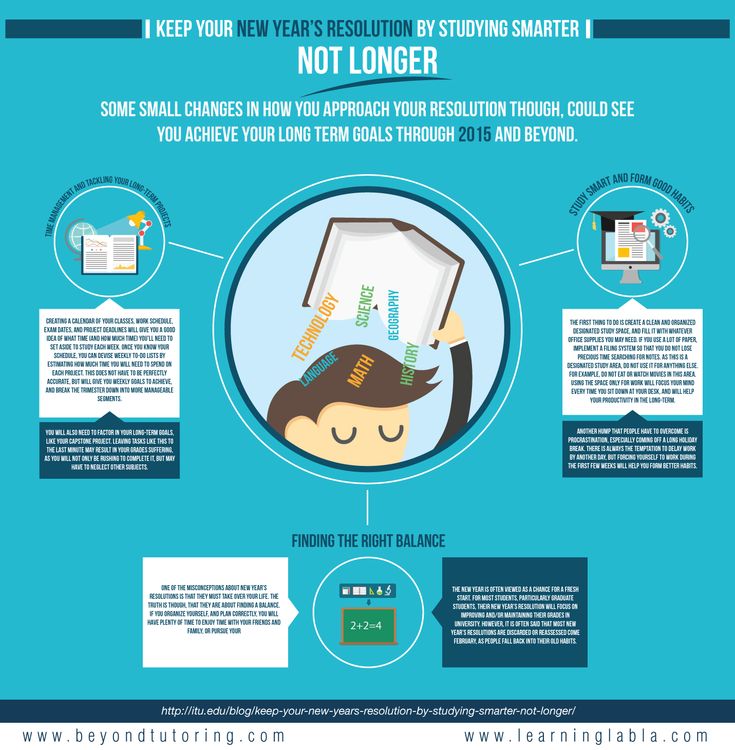 What will try to stop you? What has sidelined you before?
What will try to stop you? What has sidelined you before? - Plan: How will you get around it?
Answering these questions doesn’t need to take a lot of time. Dr. Oettingen suggested three to five minutes to start; make sure you’re in a place where you won’t be interrupted. (Want to try it? Here’s an app that might be useful.)
I can’t stick to this routine. Maybe your routine simply isn’t flexible enough.
In a 2015 study, researchers paid two groups of people to go to the gym for a month. The first group was paid if they started a workout within a two-hour window they chose in advance. The second group was paid whenever they went to the gym. After that month, researchers found that the second group was more likely to stick with the gym habit.
The takeaway? Set a plan, but be flexible when life gets in the way.
“It’s critical to learn how to have a backup plan rather than just throw your hands up and give up,” said Dr. Milkman, who conducted the study.
Milkman, who conducted the study.
I’m getting too much outside pressure. This could be a sign that you’re trying to change for the wrong reasons. Have a talk with yourself about whether you want to make this change for you or because someone else told you to. “Always try to put a beat in there where you consult with yourself,” said Dr. Bennett.
I slipped up. The first time you revert to your old ways, forget it. “If you screw up, what you should do the first time is just pretend it didn’t happen. Don’t engage in that negative mindset,” Mr. Duhigg said. “Just wake up the next day and pretend you didn’t slip and go back to whatever the pattern was you were trying to encourage.”
If you keep slipping up, instead of blaming yourself, try to look at your behavior to figure out where the process is breaking down. In “The Power of Habit,” Mr. Duhigg writes about a man who had tried to quit smoking dozens of times until he identified the reason he smoked was because it made him feel calm.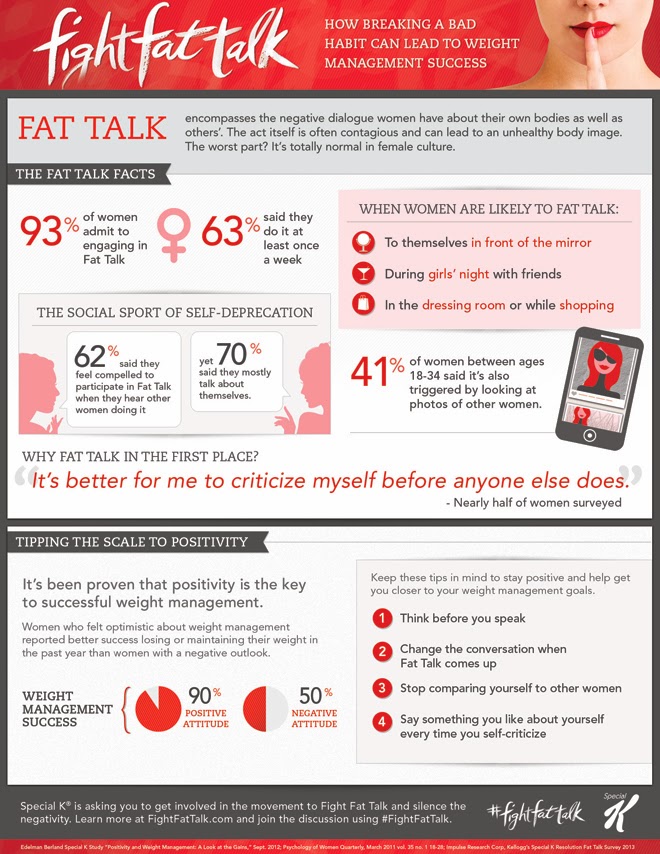 Then, he tried to find a calming substitute for smoking and kept failing, eventually landing on meditation, which allowed him to quit smoking.
Then, he tried to find a calming substitute for smoking and kept failing, eventually landing on meditation, which allowed him to quit smoking.
“If a choice doesn’t succeed that doesn’t mean that we blame ourselves. It means we have more data for our experience and we’re probably going to succeed better next time,” Mr. Duhigg said.
How Technology Can Help
Find a Community
You don’t need to do it alone, especially if your resolution starts in the new year when you’ll have plenty of company in trying to make a life change.
State Your Goal
You don’t necessarily need to find a special group, but you should let a person or two know that you’re setting a goal. “Tell them your plan and ask them to hold you accountable,” Dr. Milkman said. That way it’s a public commitment, and you might feel like you have a community supporting you that wants to see you succeed.
You can also use social media to make your goal public, like posting on Facebook that you will learn to cross-stitch by July 1, along with updates of your hobby in progress. But that can be a double-edged sword, Dr. Wallin said. You might get a boatload of sympathy at a time when you really need a strong push, or even worse, you’ll get unsolicited feedback from someone you haven’t spoken to since seventh grade. “You’ll get a lot of advice, which most people don’t want but are going to get anyway,” she said.
But that can be a double-edged sword, Dr. Wallin said. You might get a boatload of sympathy at a time when you really need a strong push, or even worse, you’ll get unsolicited feedback from someone you haven’t spoken to since seventh grade. “You’ll get a lot of advice, which most people don’t want but are going to get anyway,” she said.
Stand to Lose Something
Namely, money. That could mean you give your brother $100 and you can’t get it back until you reach your goal. Or, for something more formal and formatted, Dr. Milkman recommends stickK.com, a website where you make a financial pledge that you’ll lose if you don’t reach your goal.
“If there’s money on the line, the consequences are much larger,” Dr. Milkman said. “There are really stakes in the game.”
Find Likeminded Resolvers
You may find online support groups and forums (on Facebook or not) full of people who are reaching for the same goal. But real life groups can help too. Mr. Duhigg said that one reason Alcoholics Anonymous (and other Anonymous groups) works for a lot of people is, first because it’s a community, but also because there’s a belief in something else that isn’t necessarily God. For example, people have used a belief in a general higher power, even in nature, to help them achieve their goals.
For example, people have used a belief in a general higher power, even in nature, to help them achieve their goals.
“Belief is a metaphorical muscle that with practice gets strong and easier to use,” he said. “Ultimately people who are looking to change a really alluring and destructive behavior like alcoholism need to believe in the capacity to change.” Support groups can help because it’s a group setting with a lot of social reinforcement and features examples of people who have changed.
Cut Back on Bad Influences
While some friends and family want to help, others can hold you back, especially if your resolutions to cut back on a bad behavior means you can’t participate in that behavior with them or they see your wanting to change as a rejection of the way they live their lives.
For those who push back against your decision to change – your happy hour buddies, the smoking crew at work – Dr. Bennett suggested creating a script that says what you are trying to do without any shame behind it. Look at it like a memo to the people in your life about the change you hope to make. “You’re trying to take an administrative position on the issue with yourself and with others. You’re not trying to get emotional about it,” he said.
Look at it like a memo to the people in your life about the change you hope to make. “You’re trying to take an administrative position on the issue with yourself and with others. You’re not trying to get emotional about it,” he said.
For example, if you are trying to quit smoking and getting ribbing from a group of people you usually smoke with at work, try this: “I really enjoyed our time outside, but I’m really sorry that I have to back off now because stopping smoking is so important to my health. Hanging out with the gang during the smoke sessions would be more than I could tolerate. Again: My regrets.”
If you clearly state what you’re trying to do, and that person continually pushes back, it could be a sign that the relationship isn’t a good one for you. This can often be an issue in a relationship where one partner continues with a destructive habit when the other is trying to quit. “You really need to ask yourself whether this is a red flag about something in a relationship that can be very dangerous for you that you want to be prepared for in advance,” Dr. Bennett said.
Bennett said.
Resolution Stories
If You Miss Your Goal
You didn’t fail. You’re your own experiment, so here’s what to try on your second, third or 20th attempt.
First and foremost: If you fail at your resolution attempt, don’t beat yourself up, and know you’re not alone. After all, Dr. Milkman points out, “we struggle to do the things that we know are good for us because we give into impulses for instant gratification.”
Feel Free to Start Fresh
Want to try again? Remember, a resolution doesn’t need to be tied to New Year’s. “It can be following a weekend, following a birthday,” she said. So if you missed your New Year’s goal, you can start again tomorrow, on a Monday, after Valentine’s Day or any marker that means something to you, just as long as you’re ready to give it another go. It won’t guarantee success, but you don’t need to wait until another year comes around on the calendar to give it another go.
And be kind to yourself. “We talk in much harsher tones to ourselves than we would to other people,” said Dr. Wallin. “We wouldn’t say to a kid trying to learn something ‘that’s so stupid’ but that’s how we talk to ourselves.”
“We talk in much harsher tones to ourselves than we would to other people,” said Dr. Wallin. “We wouldn’t say to a kid trying to learn something ‘that’s so stupid’ but that’s how we talk to ourselves.”
When resolutions run off the rails or fall apart but you still want to try again, talk to yourself like “a child who’s feeling discouraged. You wouldn’t say ‘that’s because you’re an idiot.’ You would say ‘come on you can do it.’”
Dr. Wallin offered a few more common self-put downs, and ways to flip the script:
- Instead of “I blew it. What’s the point now?”
…say, “That was a bad decision, but a good learning opportunity. What’s my next step?”
- Instead of, “I’m SO hungry!”
…say, “I’m hungry, which means it’s working! It’s a bit uncomfortable, but I’ve gotten through worse.”
- Instead of, “My legs are SO sore. I can’t possibly work out today"
…say, “Let’s give my leg muscles a rest today. What can I do to work my arms?”
or: “Of course my muscles are sore.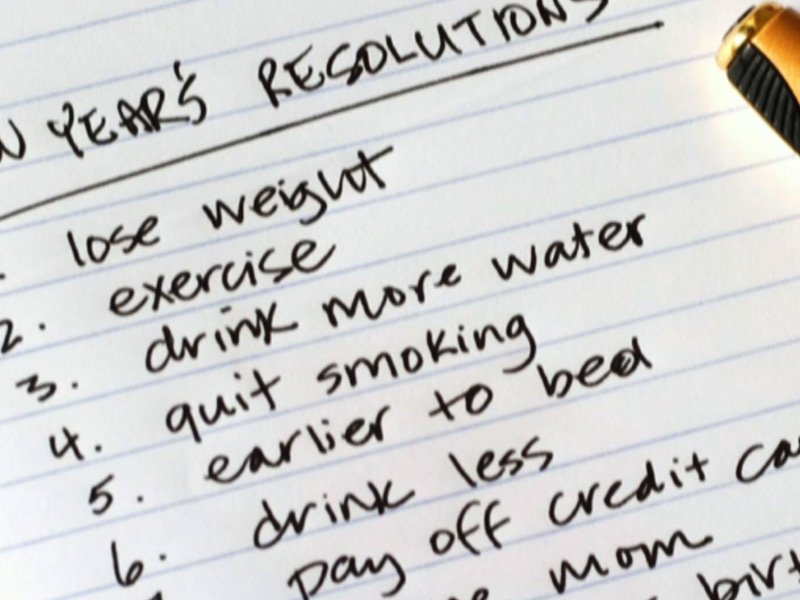 They’re supposed to be. It will get easier."
They’re supposed to be. It will get easier."
- Instead of, “This is too hard!”
…say, “Making it through today is going to really build my confidence.”
More on Making a Lasting Habit
6 tips for those who want to fulfill their New Year's resolutions
January 5Motivation
If your attempts to change your life since January 1 have failed all the time, try a different approach in 2022.
Iya Zorina
Author of Lifehacker, athlete, CCM
Share
0Most of our promises for the coming year are about changing habits. For example, to exercise twice a week, as you solemnly promise yourself, momentary motivation is not enough. You need the power to do it. And this is not at all willpower, which, as you know, is finite, but the power of habit.
To start a habit, you need certain situations, favorable external factors and the right inner attitude. This is real, although it will require a lot of time and effort on your part.
This is real, although it will require a lot of time and effort on your part.
1. Control your impulses
Everyone has momentary weaknesses that do not go well with their goals. If you go through them one, two, five times, a habit is formed, and the temptations lose their power.
A good way to deal with such impulses is some kind of reward, some kind of pleasure that you find for yourself in achieving your goals and developing new habits.
For example, you decide to run every morning in the New Year, find a place where you can do it in winter, take out a tracksuit and a light jacket from the closet. In general, we are fully prepared. And on the appointed morning, waking up at 6 o'clock and remembering that you need to go for a run, you want to give up on everything and stay in a warm bed. It's cold outside, but at home you can sleep for another hour.
If you stop that urge and get out of bed, the run will most likely go through, and next time it will be easier.
So what can be done to overcome the desire not to go anywhere? Think of something nice for yourself. For example, arrange to run with friends - so you will be ashamed not to come, and running in a company is more fun than alone.
2. Gain the right skills
Do your goals require skills? Don't delay purchasing them. For example, if you decide to pump your figure in the new year, choose a convenient fitness club for yourself and talk with a trainer about individual lessons. If your goal is to buy a car and start driving, sign up for a driving course. If you want to take a leadership position, take a leadership course or read books on the topic.
The more you do to reach your goal, the more likely you are to succeed.
3. Surround yourself with the right people
No matter how hard we try not to pay attention to the opinions of others, they strongly influence us, and we involuntarily obey the attitudes adopted in society. So the people around us are of great importance in achieving goals.
For example, if in the new year you want to live more economically or save up for something important, you should not revolve around people who spend money right and left.
In order for society to help you achieve your goals, choose your company carefully. By the way, making new acquaintances from various courses that you have taken to achieve what you want helps a lot. The people there are probably infected with the same idea as you.
4. Keep Motivated
From time to time your motivation will subside. This is fine. In order not to give up moving towards your goal, you need to find something that will support your determination.
Thematic communities and sites are perfect for this, where you can chat with people who share your goals, or just read motivating information.
For example, if you want to quit smoking, in moments of weakness you can read articles about the dangers of this habit or watch a movie based on a book by Allen Carr.
5.
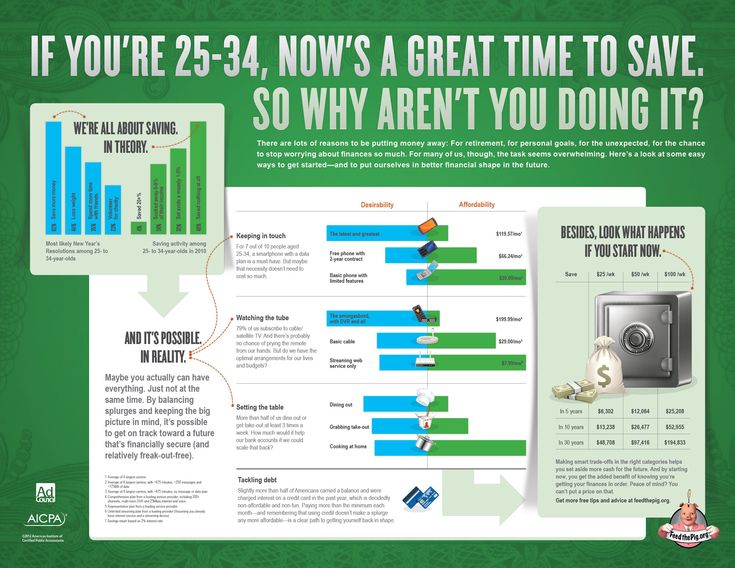 Reward yourself for small achievements
Reward yourself for small achievements It is not very pleasant to think that a person can be trained like a dog, in whose mind the execution of a command is associated with the received delicacy. However, this is true: in our brain, connections are built between the action and the reward for it. The only difference is that you train yourself by forming good habits.
For example, you could reward yourself with your favorite banana smoothie for a good workout. When you follow this sequence for several days, the brain remembers it, and it is already much easier for you to force yourself to start training.
So between you and achieving long-term goals is a long chain of small tasks and small rewards for achieving them.
6. Prepare your surroundings to achieve the goal
What surrounds you every day: objects, home and work environment, other external factors - greatly affects the ability to fulfill your promise. So along with the acquisition of the necessary skills, gradually change your environment to fit your goals.
For example, if you made a promise to yourself to keep fit, empty your refrigerator of unhealthy high-calorie foods and set aside space for home workouts. If you want to cope with social media addiction, remove them from your bookmarks, uninstall apps from your smartphone, or turn off notifications.
Take each of your targets and carefully analyze the environment for inconsistencies. If you find factors in your environment that can interfere with performance or reduce resolve, eliminate them.
Never rely on motivation alone. Instead, do your best to make your goal a new habit and make it as easy as possible to start.
Read also ✅
- 30 good habits that will boost all areas of life
- 47 questions that will help you assess the past year and plan for the next
- How to Achieve Any Goal: A Universal Guide
- Don't Aim for Something Just for Show: 4 Tips for Setting Goals
Top 45 New Year's resolutions | How to Set Yearly Goals and Achieve Them
Top 45 New Year's Resolutions | How to set goals for the year and achieve them- 10 536
- 14 min
New Year - new life. Which of us has not made promises to ourselves under the chiming clock? "This year I promise..." "I will change my life for the better." Familiar, right? But all "dreamers" are divided into two types: those who only dream, and those who turn promises into goals and make dreams come true. So how do you fall into the second category and really start a new life with a new year? Let's figure it out together.
Which of us has not made promises to ourselves under the chiming clock? "This year I promise..." "I will change my life for the better." Familiar, right? But all "dreamers" are divided into two types: those who only dream, and those who turn promises into goals and make dreams come true. So how do you fall into the second category and really start a new life with a new year? Let's figure it out together.
We've compiled a list of the most popular New Year's resolutions we make to ourselves on this big night. We also looked ahead and thought: what prevents us from fulfilling them? Thus was born a list of tips to keep in mind when setting goals for the year and achieving them. In addition, we have prepared several options for to-do list templates so that you can fulfill your dream as quickly as possible.
Plans for the year: what promises to make to yourself on New Year's Eve?
- Stop eating at night, lose weight and keep fit.
This is the most common promise we regularly make to ourselves but never keep.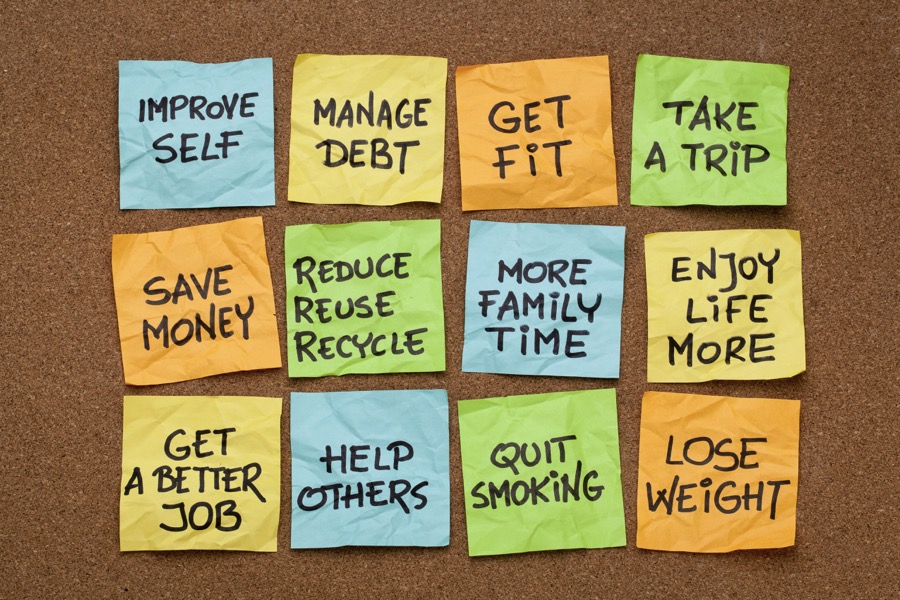
- Get rid of a bad habit.
Smoking, alcohol, nail biting? This has no place in the new year! - Change or find a job.
And also earn a promotion, implement changes in the workflow. - Engage in self-development and enroll in courses.
Find what you like and go ahead, master a new business! It's never too late to learn. - Buy a subscription to the fitness center.
And not only buy, but actually go there. Or do fitness at home - as you like. - Spend more time with your family.
In the daily hustle and bustle, we often forget to devote time to those closest to us. And it’s worth seeing each other not only on holidays. - Spending more time with friends.
Friends will always support you in difficult times, so find time for them, and not just for your favorite job. - Take more pictures.
Photos are valuable memories. And with the help of the Photo Manager program, you can easily sort your photos into albums and not spend a lot of time on it.
- Be less nervous about trifles and learn not to take everything to heart.
Some things and events are completely impossible to control, so you shouldn't worry about them, especially in the new year. - Travel more.
Stop being jealous of travel bloggers, it's time to become one! - Move to another city / house.
Sometimes we just need a change of scenery. And with the move, more opportunities open up: new acquaintances, a new job. - Learn a foreign language.
The second most popular promise. There are a lot of reasons to learn: you can watch TV shows in the original, travel safely, and it’s also good for the functioning of the brain. - Learn to play a musical instrument.
You won't know you have a talent until you try it. - Learn to save. Start counting your expenses. Don't waste money on useless things.
And spend the saved money on something really necessary.
- Learn not to be late.
This will help to avoid reprimands from superiors and disgruntled looks from friends. - Protect the environment.
Refuse plastic, ride a bike, volunteer… - Limit junk food.
Not only do we all love burgers and pizza, but we are also well aware of the consequences they lead to. If you do not completely abandon fast food, then at least reduce its amount. - Save up for what you have been dreaming about for so long.
Let it not even be an apartment or a car, but something smaller - but with your own money! - Less internet / phone / social services networks.
While we spend time in front of a monitor screen or with a phone in our hand, life passes nearby. - Finally make repairs. Fix what has long been broken. Create comfort at home. Throw away what is no longer needed.
Buy new sofa cushions, fix a dripping bathroom faucet, change old wallpaper. New Year is a time of change!
New Year is a time of change! - Read more books.
Don't try to chase lists of books that "should be read before N years". Read what you like. - Become more organized.
Making and doing a to-do list is easier than you think! - Get a pet.
Dog? Cat? Do not forget about the fish - the most unpretentious pets. - Do not live in debt / Do not take loans.
Situations, of course, are different, but it is much more pleasant not to resort to financial assistance from the bank or friends. - Tidy up sleep patterns.
Get up earlier, go to bed earlier and, most importantly, get enough sleep. - Fall in love / Marry / Get married.
Finding your soul mate is the cherished dream of many. - Overcome your main fear.
Public speaking? Fear of heights? Start gradually learning to deal with your fears. - Eat homemade food, not processed foods.
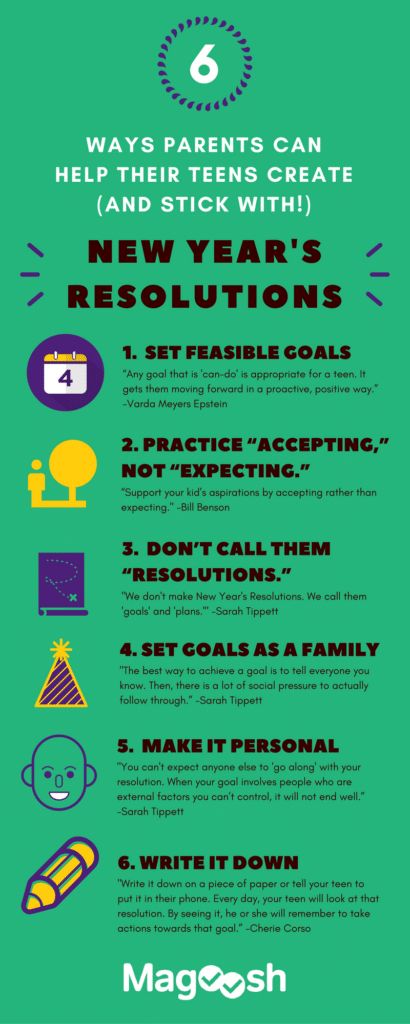 Learn to cook.
Learn to cook.
Homemade food is much tastier and healthier than store-bought salads. - Finally find time for your hobby.
Really a hobby. Embroidery, skiing, numismatics. And no, lying on the couch is not a hobby. - Change image / Change appearance.
Swap a T-shirt for a formal suit, jeans for a dress, dye your hair or change your haircut. All in your hands. - Change your social circle.
Make new friends, make peace with those with whom you have quarreled for a long time, stop communicating with people who have a bad influence on you. - Do something new every day.
Try new dishes, visit new places - there are many interesting things around us! - Stop scaring people off with excessive sarcasm.
If your goal is to make new friends, this may be one of the tasks to achieve it. - To break some stupid stereotype.
Anything: music, hair color, the behavior of others.
- Change yourself / Become better.
No one is perfect, but you should always strive for it. - Learn to pamper yourself.
Do not set yourself this goal if you also decide to control expenses. - Do charity work.
Help in animal shelters, hospitals, orphanages - not only financially, but also in business. - Tell your loved ones more often that I love them.
It's always nice, even if they know it. - Do something crazy.
To jump with a parachute, go around the world - everything that has always been feared. - Pass on the rights / Buy a car.
In fact, owning a car is not something everyone wants. But this item will definitely not suit you if you prefer to know all the taxi drivers and minibus drivers of the city by sight. Or you don't want to quarrel with your personal driver. - Take better care of your health.
Even if you are an incorrigible workaholic, health should be more important.
- Worry less about what others think of you.
You can't control what others do and think, so you shouldn't focus on it. - Stop gossiping.
It's hard to resist, but it's possible. - Be yourself and not adjust to others if you think their position is wrong.
Often we need to live and work together, in a team, in a team. But sometimes people do not notice how they impose their opinion. Don't forget your individuality. - Enjoy life. Appreciate life.
Despite all the ups and downs, we have one life. Try to see happiness in small things, do not waste time on quarrels, worries and other negative emotions. Wake up every morning with only a smile on your face, because the main thing is to live, not to exist. Becoming happy is easy.
10 tips on how to reach your goals and change your life
- Set realistic goals. Perhaps space flight will remain a dream for you. Assess how feasible this goal is for you.
 Although... perhaps there are no impossible tasks - for some it is only necessary to make more efforts.
Although... perhaps there are no impossible tasks - for some it is only necessary to make more efforts. - Do not set yourself too many goals and objectives. The slower you go, the further you will be. You should not rush to radically change both your personal life and career at the same time. Focus on one global goal, and then take on another.
- Weigh the pros and cons. If you decide to change jobs, don't lash out, don't quit on January 1st. Decide what you want out of your new job first, and keep in mind that you still have a mortgage to pay. If you want to lose weight - do not go on a hunger strike and do not register in the gym.
- Decide on an action plan and the resources you need. Break down your goal into several small tasks and make a list that you can even print out and hang on the wall for reference. To achieve some goals, certain resources are needed. You need money to go on vacation. Making money is another sub-goal.
- Try to do something from your plan every day.
 Often we are frightened by the magnitude of our own goal, and we subconsciously put it off until later. This very “later” will never come if nothing is done for it. It is impossible to read War and Peace in a day, but if you read one chapter or EVEN a page a day, then you yourself will not notice how you turn the last page. Is it difficult to learn a foreign language? Get in the habit of learning one new word a day.
Often we are frightened by the magnitude of our own goal, and we subconsciously put it off until later. This very “later” will never come if nothing is done for it. It is impossible to read War and Peace in a day, but if you read one chapter or EVEN a page a day, then you yourself will not notice how you turn the last page. Is it difficult to learn a foreign language? Get in the habit of learning one new word a day. - Set realistic deadlines. It is hardly possible to learn how to play a musical instrument in one hour. Decide how much time you need to fulfill your dream. Take with a small margin and error for unforeseen situations. Perhaps you can even divide the path to success into several stages and reach each stage gradually.
- Conquer your laziness. Often we throw something out of fatigue and laziness. This is especially true for losing weight, playing sports or learning foreign languages. You need to make a schedule and make it a rule to follow it.
After all, it is worth skipping one workout or postponing the study of grammar until tomorrow - and there is a high probability that you will not return to the gym again, and the textbook will be covered with dust.
- Conquer your fear. Many tasks seem impossible. But if you do not give up and do not stop in front of difficulties, everything is possible. Rejected at a casting or interview? Prepare better and try again.
- Find outside support. Sometimes we need the support of relatives, friends, loved ones. Try to pull them over to your side - everything is easier together. Or find a community of like-minded people on the Internet: participate in marathons, challenges and relay races. But this does not mean at all that if you have not found support, you need to say goodbye to the dream! Move towards your goal no matter what.
- Start a new life not tomorrow, but today. The longer you wait, the more likely it is that this promise will carry over to the next year.
Take action! The diet does not start on Monday, but right now.
New Year's resolution list template
We have prepared several free template options to make it easier to set goals for the new year and, of course, achieve them. Templates can be printed and entered manually, or you can enter information digitally using Movavi Photo Editor.
1. Checklist for 365 days
Free Download Template
This checklist template is good for those who want to do something every day - play sports, do something new every day, etc. Or for those who want to gradually move towards their goal - all your achievements for the day will be visually marked with a tick.
2. List of New Year's resolutions
Download template for free
This option is ideal for those who decide to use the New Year's resolution as some kind of game in the company. Have everyone present write their New Year's resolutions. Such a “certified” piece of paper can serve as a motivation for the fulfillment of a dream. And you can even put it in a time capsule so that at the celebration of the next new year you can check who managed to do what and changed life for the better. If you wish, you can even make a copy or print two options: one for yourself, and the other for the time capsule.
3. A template for confident achievement of the goal
Download the template for free
In order not to forget why you still set a goal, you may need such a reminder template. Describe in detail what you want to achieve, make a list of tasks and deadlines. So you will always remember what you need to do to fulfill your dreams.
You can combine these templates in order to definitely achieve something in the new year. We wish you good luck in the new year, fulfillment of desires and achievement of all your goals!
Share
Share
Subscribe for new posts
Invalid email format
An unknown error has occurred. Please try again later.
Your e-mail address has been successfully added.














